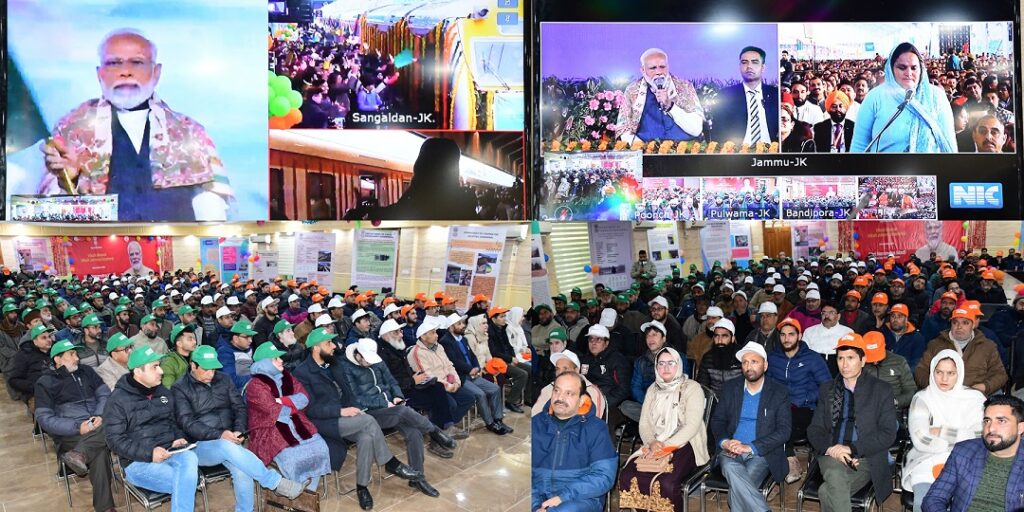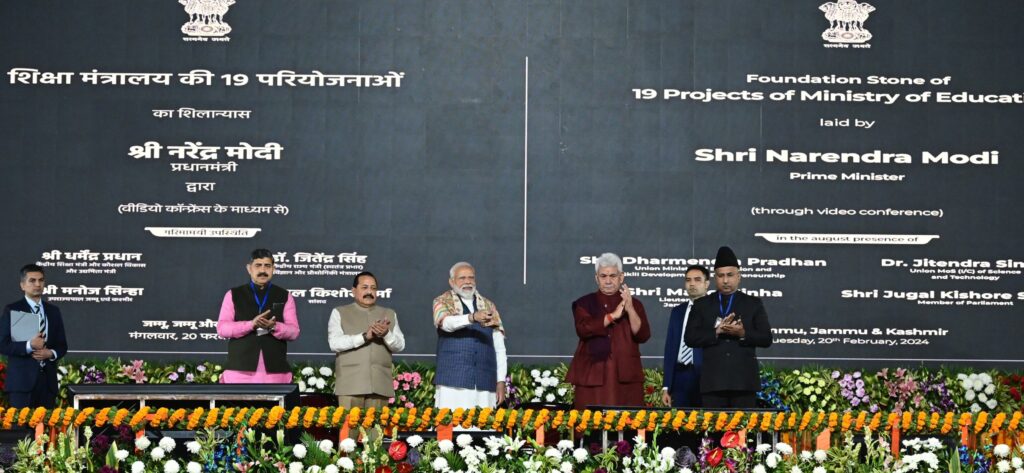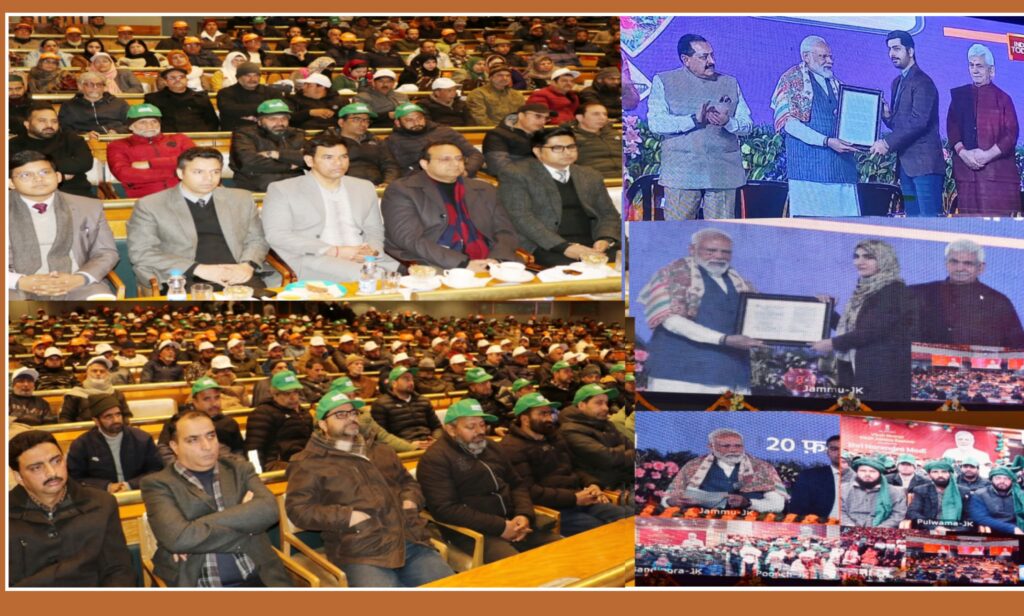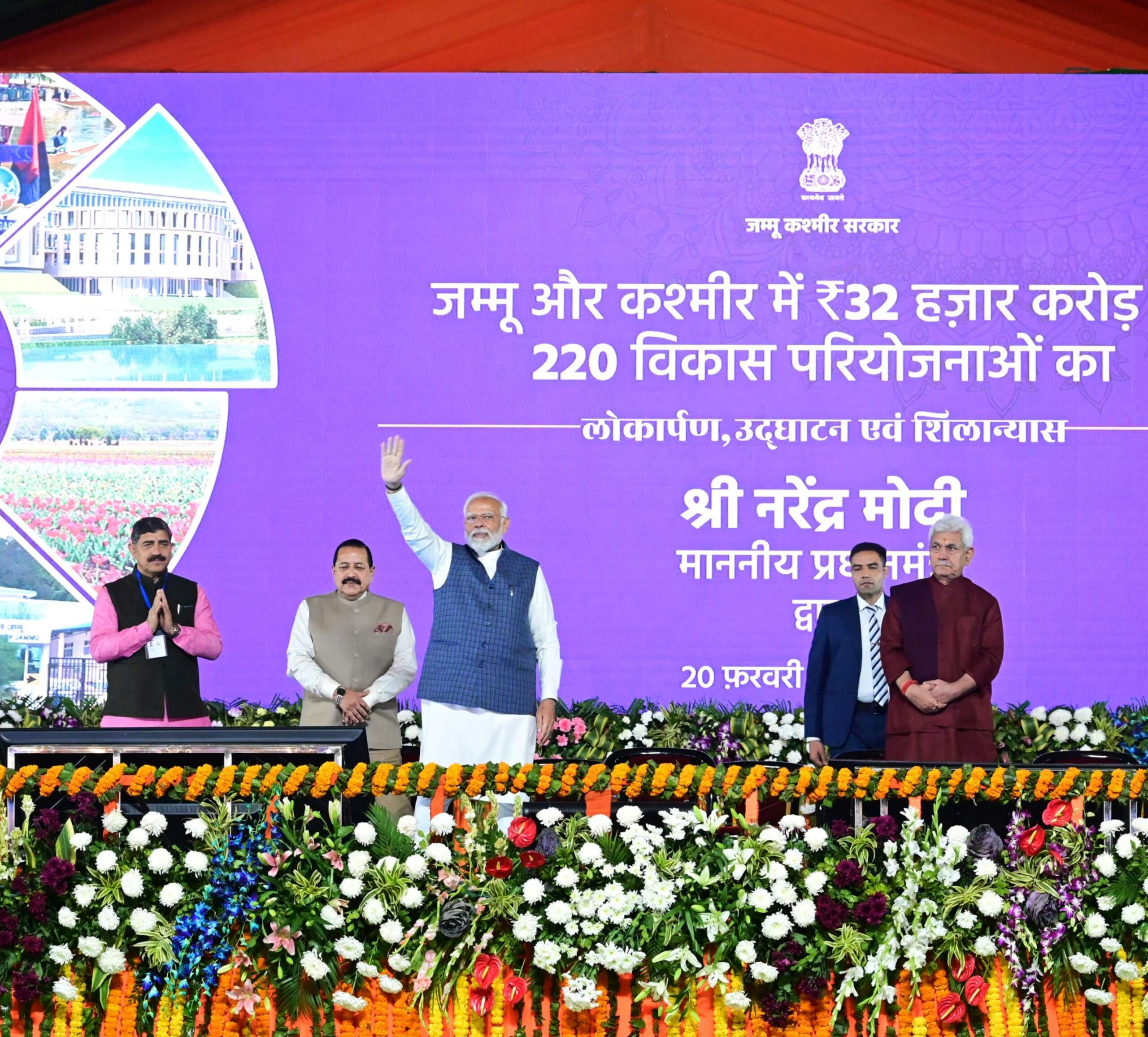On Prime Minister Narendra Modi’s historic journey to Jammu and Kashmir, he unveils a sweeping roadmap for the region’s development, marking a significant milestone in the post-Article 370 era. With projects worth 32,000 crore rupees, PM Modi’s vision promises holistic growth and prosperity.
By Ajaz Rashid
In a landmark visit to Jammu and Kashmir, Prime Minister Narendra Modi unveiled a sweeping roadmap for the region’s development, marking a significant milestone in the post-Article 370 era. With an infusion of projects totaling a staggering 32,000 crore rupees, PM Modi reiterated his dedication to fostering comprehensive growth and prosperity in the area.
The Maulana Azad Stadium in Jammu buzzed with energy as crowds cheered and tricolors fluttered, setting the stage for PM Modi’s address. Against this backdrop, he emphasized the government’s commitment to bolstering infrastructure across the region, inaugurating multiple road projects aimed at enhancing connectivity and stimulating economic growth by linking isolated communities to regional markets.
Recognizing the immense tourism potential of Jammu and Kashmir, PM Modi unveiled strategic initiatives to position the region as a premier global destination. Plans to attract investments from Gulf countries and garner increased international attention were announced, with a vision to rival renowned tourist destinations like Switzerland.
Inaugurating a slew of ambitious infrastructure projects aimed at enhancing connectivity and mobility, PM Modi reiterated his vision of positioning Jammu and Kashmir as a leading tourist destination on the world stage, capable of competing with renowned hotspots like Switzerland.

Surge in Gulf Investments Post-G20 Event: Following a high-profile G20 event held in the region, Jammu and Kashmir has witnessed a significant surge in investments from Gulf countries. The global attention garnered by the event has underscored the scenic beauty and untapped potential of the region, positioning it as an attractive destination for international investment and tourism. PM Modi, highlighting the region’s appeal, remarked, “The recent surge in investments from Gulf countries reflects the growing recognition of Jammu and Kashmir’s economic potential on the global stage.”
Optimism Regarding Gulf Investments: Prime Minister Modi expressed optimism regarding the influx of investments from Gulf countries into Jammu and Kashmir. Highlighting the positive reception towards the region following the G20 event, PM Modi reiterated his confidence in leveraging these investments to fuel economic growth and development, further enhancing the region’s global standing. PM Modi stated, “We are committed to harnessing the potential of Gulf investments to drive sustainable development and prosperity in Jammu and Kashmir.”
In line with the government’s focus on empowering youth, PM Modi inaugurated educational projects aimed at promoting skill development and entrepreneurship. New schools, colleges, and vocational training centers were launched to provide quality education and training opportunities.
Healthcare initiatives aimed at improving access to quality services were also introduced, with a focus on enhancing healthcare infrastructure and ensuring the well-being of marginalized communities.

Illuminating on the enhancements in healthcare infrastructure in Jammu and Kashmir, the Prime Minister highlighted significant progress. He noted that the number of medical colleges in the region has surged from 4 in 2014 to 12 presently. Moreover, there has been a remarkable increase in MBBS seats, with over 1300 available today compared to 500 in 2014, along with the establishment of more than 650 PG medical seats, a stark contrast to none in 2014. Additionally, the Prime Minister mentioned the establishment of 45 nursing and paramedic colleges over the past four years. Furthermore, he announced the forthcoming establishment of two AIIMS in Jammu and Kashmir, with the Jammu AIIMS inaugurated during his visit. PM Modi underscored the nationwide initiative, noting the sanctioning of 15 new AIIMS in the country over the last decade.
Central to PM’s address was the acknowledgment of the historic significance of the abrogation of Article 370, which he described as a pivotal moment liberating Jammu and Kashmir from outdated constitutional provisions, opening doors to unprecedented opportunities for growth.
The abrogation of Article 370 has yielded positive outcomes for various communities in Jammu and Kashmir. Groups including Valmikis, Safai Karamcharis, Paharis, Kohlis, and Scheduled Tribes (STs) have experienced a newfound sense of inclusion and empowerment, with measures taken to ensure their due share of benefits and opportunities in the region’s development trajectory. PM Modi expressed satisfaction, stating, “The abrogation of Article 370 has paved the way for equitable development and social justice for all communities in Jammu and Kashmir.”
Pointing out the reservation for ST in the Legislative Assembly and OBC reservation in Panchayats, and urban local bodies, the Prime Minister said, “Mantra of Sabka Saath, Sabka Vikas, Sabka Vishwas and Sabka Prayas is the foundation of the development of Jammu and Kashmir.”
International Recognition and Youth Empowerment: Prime Minister Narendra Modi’s recent visit to Jammu and Kashmir highlighted the region’s burgeoning potential on the global stage. Emphasizing the surge in tourism and investment opportunities due to heightened international attention, PM Modi remarked, “The world is taking notice of Jammu and Kashmir’s potential.”
Central to PM Modi’s development agenda is the empowerment of youth—a demographic powerhouse brimming with talent and potential. He highlighted that a new wave has emerged in the country that shuns the politics of dynasty and appeasement. “Youth of Jammu and Kashmir are blowing the begul of development and moving forward to create their future”, he said.

Engagement and Electoral Empowerment: Prime Minister Narendra Modi engaged with beneficiaries of flagship schemes such as Ayushman Bharat, Jan Jewan, and the Sehat Scheme during his visit to Jammu and Kashmir. Seeking direct feedback from the recipients, PM Modi reaffirmed the government’s commitment to ensuring the effective implementation of welfare programs aimed at improving healthcare access and overall well-being. Highlighting the importance of citizen engagement in fostering socio-economic empowerment, PM Modi told citizens, “Your feedback is invaluable in shaping our efforts towards inclusive development”.
With Lok Sabha polls looming, PM Modi called upon Jammu and Kashmir’s people to support his party and the broader National Democratic Alliance. Asserting the annulment of Article 370 as a significant achievement, PM Modi’s visit served as a rallying cry for voters to embrace the transformative vision of a New India.
Dynastic Politics Critiqued: Prime Minister Modi minced no words during his address, criticizing the entrenched practice of dynastic politics in Jammu and Kashmir. He emphasized how certain political parties, driven by dynastic ambitions, had prioritized their own interests over the welfare of the common people. PM Modi stated, “The region had suffered under such dynastic rule.”
End of Dynasty Rule and Commitment to Inclusive Governance: With the abrogation of Article 370, PM Modi heralded the end of dynasty rule in Jammu and Kashmir. Expressing satisfaction, he remarked, “I am satisfied at witnessing the end of dynasty rule in the region.” This move signifies a transition towards inclusive governance, where the needs and aspirations of all citizens are prioritized. PM Modi reaffirmed his commitment, stating, “I pledge to uphold principles of transparency, accountability, and inclusivity in governance.”
Empowerment of the Common People and Vision for Inclusive Development: PM Modi reiterated the importance of empowering the common people, stating that a government focused on the welfare of just one family cannot adequately cater to their needs. By dismantling the barriers imposed by dynastic politics, the government aims to provide opportunities for socio-economic advancement and a brighter future. Emphasizing inclusive growth, PM Modi called upon the people to embrace a transformative vision prioritizing meritocracy, equality, and justice for all, regardless of familial or political affiliations.
Background
In a landmark visit to Jammu and Kashmir, Prime Minister Narendra Modi unveiled a series of transformative projects aimed at propelling the region towards comprehensive development. These projects, collectively worth 32,000 crore rupees, constitute a significant milestone in the post-Article 370 era, reflecting the government’s commitment to fostering holistic growth and prosperity.
One of the key highlights of the visit was the inauguration of the All India Institute of Medical Sciences (AIIMS) in Vijaypur (Samba), Jammu. Established at a cost of over 1660 crore rupees, this state-of-the-art healthcare facility spans an area of 227 acres and is equipped with 720 beds, a Medical College, a Nursing College, and various specialized departments including Cardiology, Gastroenterology, and Neurology. The AIIMS is set to provide comprehensive tertiary care services to the people of Jammu and Kashmir, marking a significant advancement in the region’s healthcare infrastructure.

Furthermore, the Prime Minister laid the foundation stone for a new terminal building at Jammu Airport, aimed at enhancing air connectivity and facilitating the movement of passengers. Spread over 40,000 square meters, the environmentally friendly terminal will showcase the local culture of the region while accommodating around 2000 passengers during peak hours. This initiative is expected to boost tourism, trade, and economic growth in the region.
In the realm of transportation, Prime Minister Modi inaugurated the Banihal-Khari-Sumber-Sangaldan railway line, spanning 48 kilometers. This was accompanied by the flagging off of the first electric train in the Valley and the launch of a new train service between Sangaldan and Baramulla stations. Additionally, the electrification of the Baramulla-Srinagar-Banihal-Sangaldan section covering 185.66 kilometers was inaugurated, signaling a new era of efficient transportation connectivity.
Additionally, the Prime Minister laid the foundation stone for various road projects, such as the Delhi-Amritsar-Katra Expressway, the four-laning of Srinagar Ring Road, and the upgradation of the Srinagar-Baramulla-Uri stretch of NH-01. These initiatives will not only improve transportation infrastructure but also facilitate pilgrimage to Mata Vaishno Devi shrine, reduce traffic congestion, and enhance connectivity to tourist destinations.
PM Modi listed the road projects in the region. Among today’s projects, he mentioned the second phase of the Srinagar Ring Road which will improve access to Manasbal Lake and Kheer Bhawani temple. Similarly, the Srinagar-Baramulla-Uri highway will benefit farmers and tourism. Delhi Amritsar Katra Expressway will make it easy to travel between Jammu and Delhi.
In the energy sector, the Prime Minister initiated the development of a Common User Facility (CUF) Petroleum depot at Jammu, which will have a storage capacity of about 100,000 KL for various petroleum products. This fully automated depot, costing approximately Rs 677 crore, will play a crucial role in meeting the region’s fuel requirements and ensuring energy security.
Furthermore, Prime Minister Modi inaugurated and laid the foundation stone for several other development projects worth over Rs 3150 crores, encompassing civic infrastructure, public facilities, industrial estates, and smart city initiatives across Jammu and Kashmir. These projects aim to strengthen the region’s economy, improve quality of life, and foster inclusive growth.

Leave a Reply